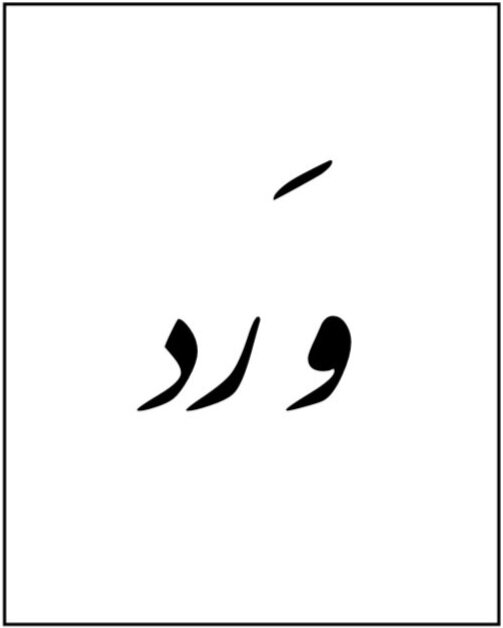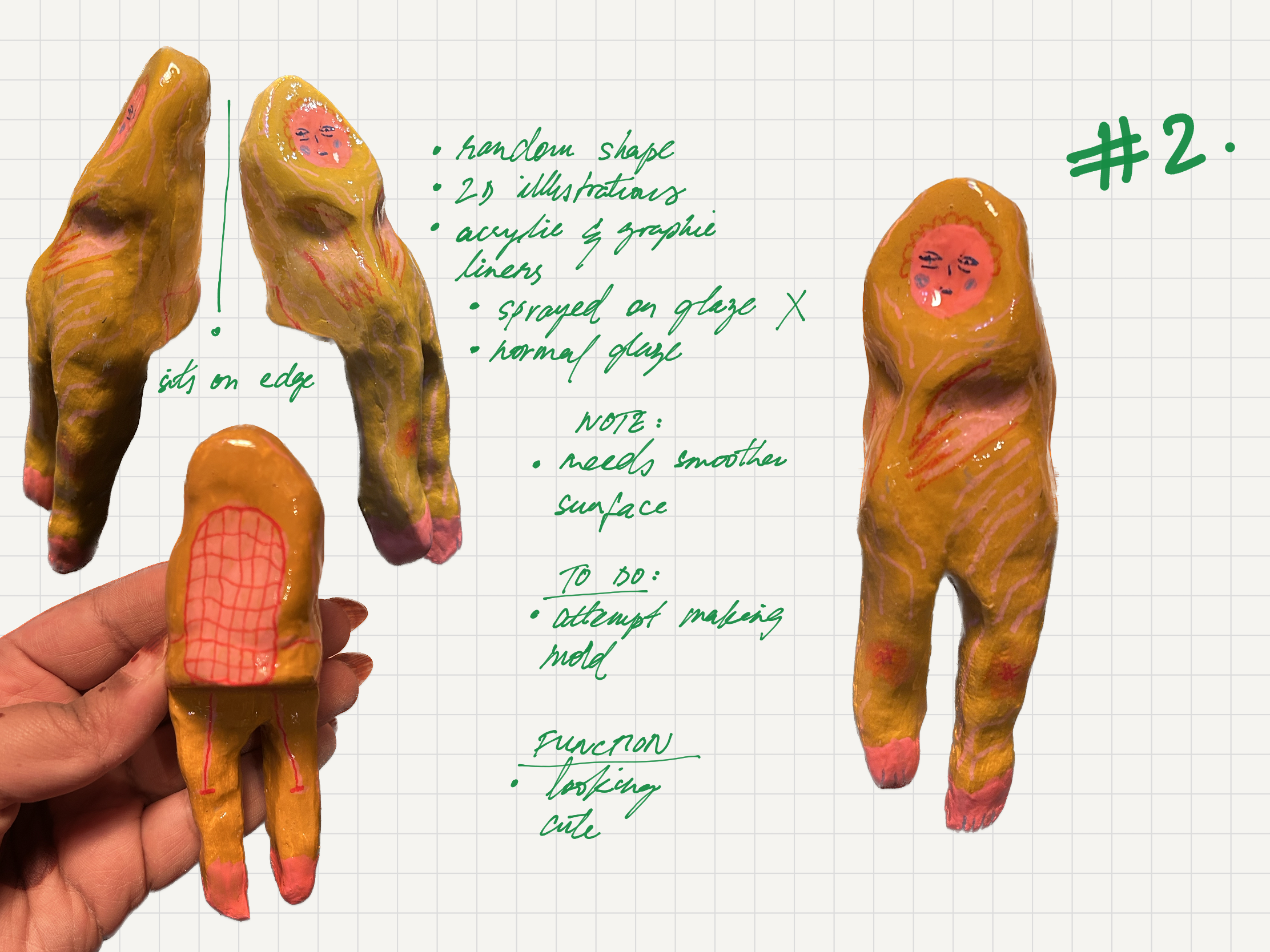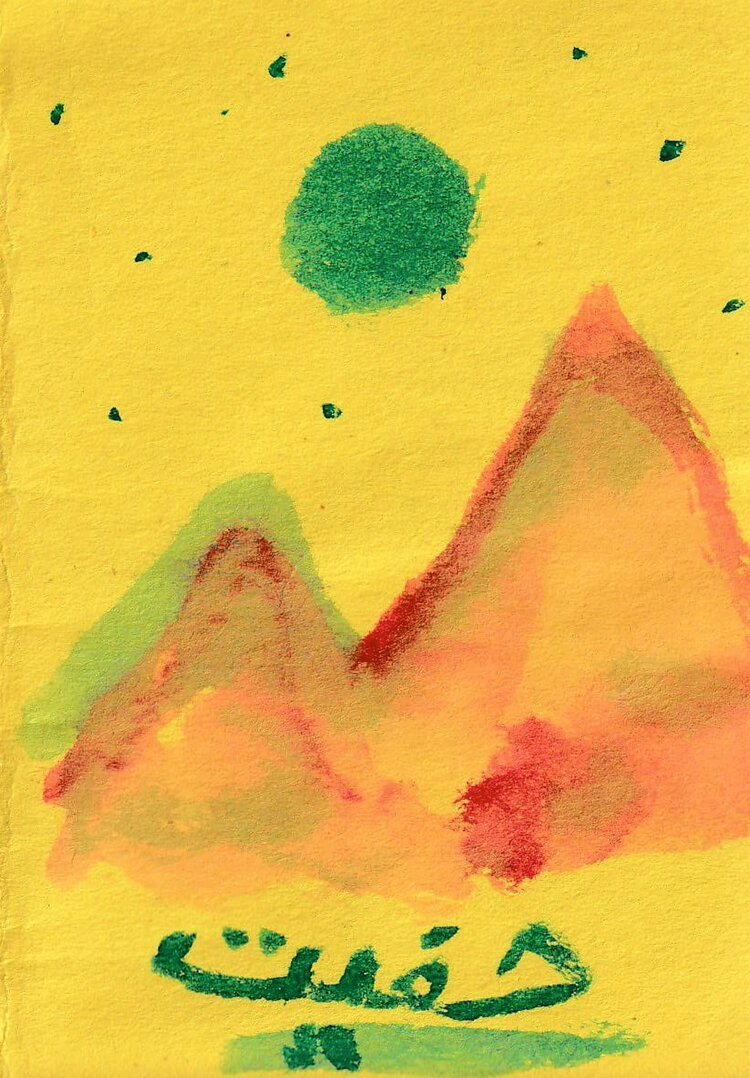On Cultivating Community and Glitched Plants: An Interview with Sarah Ahmed
Writing this introduction feels like finally getting to sit down and sing an ode to Sarah Ahmed. She is the closest thing we’ve witnessed to being a magician. Besides being an artist, zine-maker, the founder of Jaffat El Aqlam and other initiatives, she is first and foremost a community-builder. As the eldest daughter, Sarah has ensured that the art she makes and spaces she creates are inclusive and accessible to anyone, especially Arab creatives whose unmatched capabilities and imagination are depleted due to the lack of infrastructure that supports them and their work. Ward and Unootha are two of many Arab online publications that were nurtured, built, and inspired by Sarah and her vision.
We (Fatima and Khaled) met Sarah over Zoom back in August 2023. While we wish this took place in her hometown, Abu Dhabi, we realized that having met, grown up, and created together online, it only made sense that the first time we’re all in one room it’d be on Zoom. In this conversation, Sarah tells us more about growing up, helping others find their voice while also finding her own, and making many, many zines. She takes us back to 2014, when Jaffat El Aqlam was founded, and traces all the hubs and communities and artists that shaped her.
Khaled: Tell us, how are you doing?
Sarah: Khaled, you’ve known me for a long time, since I was in college. We grew up. We started working. It’s really difficult keeping everything as it was. I try, but it's not like before.
I don't know if you guys remember back then how active I was on social media. I was keeping up with everything on every platform. Now, every now and then, I go on there to check up on my friends. Everyone, of course, goes through life. And I’ve come to accept that. But I still miss experimenting and being on the go with the things I’m super passionate about, rather than getting back home from work at 5 PM, exhausted and not wanting to do anything but going to sleep or watch cartoons. And then I wake up in the morning and do the whole thing over again. I don’t mean to bore you with sad stories, but alhamdulillah for everything.
Fatima: I'm kind of experiencing this but in a different personal way, where I'm realizing my priorities, and I have to adapt.
Sarah: I didn’t know this is what growth is. I’m adapting with what I have on my plate. I wish we were told these things back then. But regret isn’t productive now. Once you know yourself, you can do work with whatever you have — you no longer beat yourself up about something you have no control of.
Fatima: On that note, I'm wondering what are the things that you are nurturing during this period in your life as you're forced (or maybe without force) to change and adapt and grow?
Sarah: I focused a lot on my career path to the extent that I neglected my emotional well-being. I kept telling myself that I’m a strong, independent woman. I’ll take care of my family. Because I'm the eldest, I wanted to handle it all.
You get to a point where you get used to being an excellent person, but you still feel you’re underappreciated. But you can’t leave now because you’re fully in it, and you have the fear of the lack of job opportunities. With work, now, I'm learning to compromise. I want to nurture myself and my own personal projects, which revolve around publishing and art, in isolation from my career.
I still enjoy work — I love what I do. But I know better how to control my expectations about where this path is leading me.
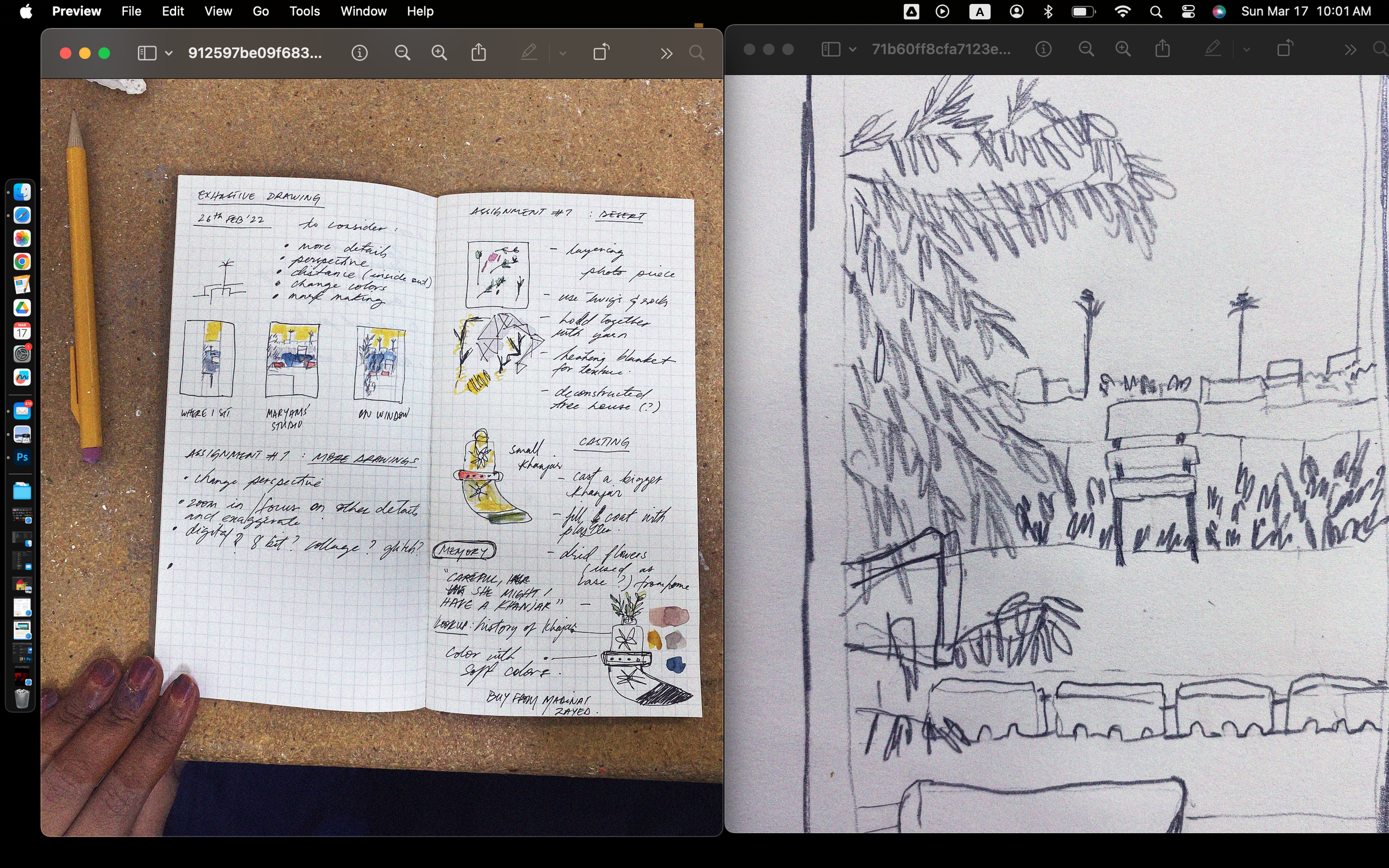


Last year, I got into the Salama bint Hamdan Emerging Artists Fellowship (SEAF), and it changed my entire life. This was my fourth time applying. I noticed in the interview how focused I was on what I wanted — it wasn't as experimental as I used to be in my art practice. I mostly spoke about children's literature and books, and how I want to make them at some point, or bring people together to make them, or whatever it takes to make them. I specifically wanted Arabic children’s books because there are words that I can’t find anywhere but in Arabic.
The fellowship constitutes teaching weeks. My cohort and I share studio spaces. My work is very 2D and practical, but this forces you to explore with 3D and other things you never thought you’d work with, so you need a bigger space. I learned a lot from this fellowship that I started wanting to create more tangible projects — things people can touch, see, and interact with on a wider scale.
That's when I started nurturing my own art, and I'm now building on the practice I began there in a new studio space with seven other incredible artists with diverse practices. [Being in this space] made me realize I need an art community. With art, specifically, it’s great to have a network. I used to have that with Jaffat El Aqlam, and when I was more “online”. But I grew distant when I started working, so I was lucky enough to have it back last year during the fellowship.
Fatima: We were about to ask about Jaffat El Aqlam!
Sarah: I really wanted it to stay longer, but I’d rather stop a project that I really love and had a great audience that looked forward to the release of every issue. I don’t think it’s fair to not give stuff you care about your all. My heart is still in it, but it's very difficult with all the other priorities I have at the moment. Even with the team, we had the time back then to dedicate our energy to it. I know everyone would rejoin it in a heartbeat if I asked, but I don’t want to burden anyone with it. I believe it is good to quit something when it has served its purpose. And, now, we have Unootha, we have Ward, we have Banat Collective, and other beautiful publications that are really dedicated to their missions. When I saw that your platforms came back after a break (even before you reached out to me, Khaled), I was overjoyed because I know how difficult it is to see things through and create and curate high-quality content.
Jaffat El Aqlam’s last issue, Sihr, which was curated by Jumairy, was supposed to be an exhibition. However, because of the pandemic, we had to brainstorm other ideas to make it happen. It was his first time curating, and it was my first time letting go. I knew it was his first baby, so I was there just for guidance without directly interfering. I’m getting goosebumps as we’re speaking – it was incredibly beautiful.
Sihr Issue
Khaled: What you've said reminded me about my conversation with Fatima when we met earlier this summer. We were talking about how we’ve been away from Ward and Unootha for a long time because we got busy with school and life. As you mentioned, I personally didn’t want to go back to Ward unless I could give it my all. I still felt guilty, though. I created this platform for people to share and connect through their art and, all of a sudden, I’m depriving them of it.
Sarah: The guilt was definitely strong for me, too. Whenever someone sees me, they immediately go, “Oh, Jaffat El Aqlam!” But my name is Sarah
Fatima: On my friend's phone, my name is Fatima Unootha.
Sarah: It’s a huge responsibility to be associated with it. Whenever someone says that, I try to communicate with them that I gave it my all. Now, it’s your turn. I started branching out into freelancing and making books. I’m willing to share and use everything I’ve learned with anyone who needs it. I’m only going back to it if I can make something better, or something at the same level — I’m not going to settle for something less, and neither do they as readers of the magazine.
For now, I’ll go through all of Jaffat El Aqlam's posts and archive them so they become accessible to anyone online now or in the future.
Khaled: That sounds gorgeous! What other projects did Jaffat El Aqlam expand into?
Sarah: Now, I’m working on 7ijra • Waraqa • Miqas (bedroom, paper, scissors). I no longer want to only post things online. I want to create and collect zines. I work on it with Aysha Almarzoogi, an amazing artist and graphic designer I got to know through instagram. Our friendship started over mutual interests. I started making more zines in the pandemic, and when I told her about them, she shared them with me. And then we started talking a bit more about zine-culture, which led her to ask if I wanted to start an initiative with her that invites people to make zines during the pandemic. It’s a very therapeutic thing to do: you just sit there and focus. And I remember we were brainstorming a name for the initiative. One of them was 7ajara Waraqa Miqas (rock, paper, scissors), but it was copyrighted by another board game company. So we settled and got mega-excited about “7ijra Waraqa Miqas” because you’re literally in your bedroom and working with paper and scissors.
We do workshops every now and then. Once I'm settled into the new studio, I'll be having people over so we can have zine and reading sessions. We're focusing on making them accessible and free of charge. After the workshops, we scan the zines. We then print the scans so the creators give them to other people, or we can archive and upload them online. I genuinely want to do this for the rest of my life. We might also release zines that people submit and do more detailed workshops with specific themes, like the one we're having soon. It is about imagining public space in Abu Dhabi as part of a research project by Salem AlSuwaidi, who is the founder of Siwalf Collective. We get people to focus on a specific theme, and then you see all these different results and perspectives of what people notice, remember, or want to remember. When it comes to art and publishing, that's where my focus is right now. And I love it so much.
7ijra • Waraqa • Miqas workshop
[Sarah went to bring something to show us something she’s been experimenting with]
I wanted to start making these tiny toys with air-dry clays and painting them with my style. I love them a lot. And I’m thinking I can make book stands or tea cups or other things for people to buy. I’m in Studio Al Reesha, by the way. We all come together and pitch in ideas, chill, work on our projects, cook together, and gift each other constructive criticism that help us grow as artists. If I want to create something sustainable [with 7ijra • Waraqa • Miqas], I need to find something that I can create and sell. It’s really fun and exciting to experiment and try new things.
Sample from Sarah’s work: Notes on clay toys she is making
Fatima: Is the studio you just mentioned, Studio Al Reesha, with the fellowship, or is it independent?
Sarah: No, it’s different. The fellowship was a shared space. Each one of us had their own studio and could access an entire floor of tools and supplies that we could create and play with. We made posters and installations and other pieces on the roof and in our studios and in the backyard. This is why it was incredible and ideas were limitless.
We also had critiques. I didn’t like them because I felt exposed—so many people are looking at you at the same time. It’s another skill I learned at 32. But I loved my final piece since it felt like a full circle to what I enjoyed most, paper and showed how versatile it is. It was a travel journal imagining someone going to their home country and coming back every year: what stuff they would bring, what stuff they would have, it almost rarely being cute souvenirs.
While making it, I was mainly thinking about my dad, may he rest in peace. Every year, he’d go to visit his family in Yemen, and when he came back, it was never with souvenirs. He would instead bring chili, and other spices. My entire installation smelled of cinnamon and a lot of spices. It was interesting to notice my emotions during the process.
It's been a very humbling experience. I tried making the piece as relevant to anyone as possible. I hope anyone who experienced that piece felt what I felt while making it: the feeling someone experiences when leaving their country to settle somewhere else, and how their home also feels about them moving.
SEAF: Sarah’s final, ongoing project
Fatima: Was the challenge with the traveling journal the subject, the medium (or both), or was it something else that was kind of challenging to it?
Sarah: It wasn't about the subject. I reached a point where I was at peace with all these emotions. Processing them wasn’t something new to me. The challenge was mostly sharing it with others because I'm a very secretive person. I share stuff because I like sharing some things with others— I share my progress and process, so that someone else could learn or benefit from the work. But when the work is extremely personal, it’s hard for me to share it and talk about it, even if it’s with close friends. When it's strangers, presenting something in a new medium I wasn't even completely familiar with, in a space where people can walk around and witness it from all sides, I felt so exposed. I had never done anything like it before.
My vibe is papers and drawings and stories that are far from physical people, so that I don’t have to see their reactions. I pay attention to the tiniest details and their faces and body language. Of course, every person has their own opinion, but there are always reactions that you don't expect. You don’t know how people will respond to the work.
Sample from Sarah’s work: Recreation of the Human Condition
I had someone talk to me about my process. She completely ignored everything. And I learned so much! She makes paper for a living and was giving me some advice. I explained the things I had to adjust or make-do with from the perspective of an installation because I didn't know how to troubleshoot specific things, and she was so helpful. Someone else asked me to translate the text before telling me it resonated with them personally, even when we were from two different cultures. You never know where the conversation is going regarding subjects, art, or medium, but you go in and keep in mind that you’re going to learn something new. Something to improve, something about the human experience, about how to treat ourselves, about how others treat us.
Of course, the exhibition was busy. My anxiety was at a million. Personally, I don't typically go to exhibition openings because I don't like crowds, but I did it. I stood, listened and entertained. I powered through, then slept for a week.
And now we're doing the same thing in Studio Al Reesha since everyone is a different kind of artist. We do studio visits. Three or four people come in and everyone starts talking about their practice and getting critiques on content, subject, medium.
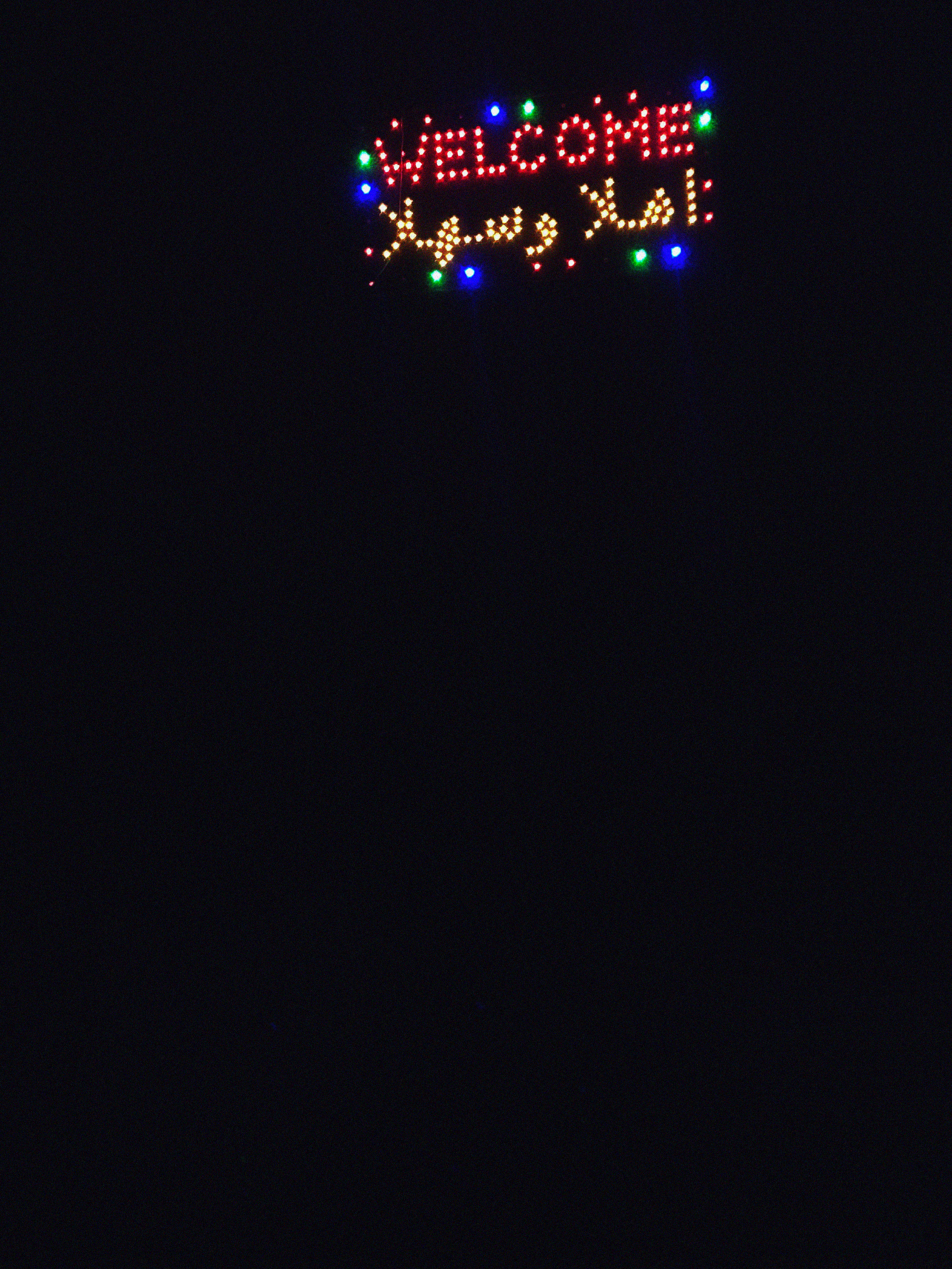


Snippets from Studio Al Reeshah and Sarah’s working station
[Sarah reading Fatima's message in the chat] ‘How can I visit the studio?’ COME. Where are you right now?
Fatima: I’m in New York right now but I’ll be in the UAE soon!
Sarah: خلي نيويورك تنفعج! [Everyone on the call erupts in laughter]
Come! We're setting up! We’ll be organizing studio tours for people to book their visits ahead, because we want to do mini workshops and tours for everyone to be here. You just walk around, and then you see whatever workshop is there. That's what I did on my first visit. I left so inspired, and after, it just so happened that I needed a space after the fellowship. They put out an open call. I applied, interviewed, and here I am! Alhamdulillah, everyone at the studio is as sweet as honey. And they’re so supportive! If someone has expertise in something specific, they'll help the other and advise them. That's what I was missing at home.
Khaled: Throughout our conversation and closely following your work, you always go back to community. With all your projects, you want to make it accessible by organizing workshops and making your skills transferable. I wanted to ask when did you notice that the seed of community was something very important? When did you realize you wanted to nurture it?
Sarah: Way after Jaffat El Aqlam! Way after did I realize that it was something I was doing. Before Jaffat El Aqlam, and even throughout high school, I was part of communities that were online. Not many were Arabs, since there weren’t any! I feel like the reason I started Jaffat El Aqlam is because I couldn't find something similar anywhere in the Middle East, or around me at least. I wondered, “why don't we have that? Laish?” We're all here, and we're all Twitter friends. From there, I started to meet and connect with more and more people, and the circle began to expand. Then someone actually said it to my face. They were like, “what you did is something I've never seen before. You started a community without knowing.
Another big moment for me was when we were asked to do Art Dubai. They invited us because they recognized that we had built a community. But I felt a little confused. Yeah, it was a community, but it was online! When it's online, community-building sometimes doesn't click the same way. I began to notice that community-building is something inherent to me. Even with my friends and family, I always want us to come together. It became clear to me how important communities are because it's important to surround yourself with like-mindedness, for your hobbies or other reasons. Even introverts need a community. I consider myself an extreme introvert, and I do appreciate my solitude, but, to what extent? How will I grow? How will I learn? How will I hear funny jokes?
Sample from Sarah’s work: Akhbiri
And there's a bigger picture. Being online makes unprecedented communities possible. You get someone from Amsterdam to collaborate with someone from Saudi. When people start letting go and trusting the process, they come up with the most beautiful things. In those moments, even though I know I was the instigator of that collaboration, it amazes and makes me so happy.
I think it sort of connects to how I want to be a teacher. That was one of my first dreams—being an English teacher. The concept of education is my passion. I want kids to be as inspired as I was with my teachers. And I need everyone to love education, not necessarily as much as I do, but at least to an extent where they see it as something that brings people and cultures closer together. I learned many of the things that helped create my personality and character online. I did have good educators, but wouldn't it be better to integrate these important things into our everyday learning?
Fatima: 7abeebty, you're already living out a version of that dream.
Sarah: When I started hosting workshops, people would ask me if I was a teacher. And I thought, "sure, why not?" With the workshops, I do realize that dream came true to some extent now, but it's evolved. I want to teach people art at the moment. I want people to see themselves as creatives. When a kid tells me, "I can't draw," I immediately respond with, "Yalla, 7abeebty, you know how to draw. Let's try this out together."
Khaled: It makes me emotional that you said that. I remember when I saw the call for submissions for Jaffat in 2015. I was 15 and just creating in Tabuk, and I really thought it would never see the light of day. I submitted out of curiosity, and you were like, "yeah, it's gonna be the cover." You give every piece of media a sense of worth that I never saw before. And assigning value to every creative endeavor and question is a skill that educators don't easily have. You just have it naturally. I want to give you your flowers for that.
Sarah: You're going to make me cry. I'm so happy you felt that because honestly I appreciate every single issue I published with Jaffet El Aqlam and every single conversation I had with people. And I remember most of the conversations! This is not to say that I never faced any criticism, but you learn to communicate and work with people with all sorts of perspectives. I specifically loved when people shared their work and everyone else's work when an issue is out. You can tell how excited they were, and that their family members were proud of them. Okay, so maybe now I have to bring back Jaffat El Aqlam...
Two of Jaffat El Alqam’s themed issues covers
Fatima: I just want you to know that that was the point of this!
Sarah: The next question, "when are you bringing back Jaffat?" No, but they were great days, but now it's your turn!
Fatima: We're not going to let you down! I am inspired by your reflections about challenges and pushing yourself and letting go. It's interesting that often challenging yourself involves letting go of something, which feels almost counterintuitive. At this point in your life, what are the inspiring challenges that you are kind of working through or working to let go of?
Sarah: I think it's actively putting in the time. Anyone can be too tired after work or doing something the whole week. One of my challenges is making the time to do what I want and forcing myself to do it. For example, if I come home and I want to play video games, I push myself to do that instead of saying, "No, I'm tired. Nevermind, another day." And the same thing applies to the work I'm doing in the studio. I go to the studio after work, and I tell myself, "Sarah, stay for two hours. Just two hours, and you can go home." But then I end up staying for more. Sure, I come home with no energy, but I also feel an unreal sense of inner calm that I'm sticking to it.
If it doesn't work out, 5laa9, fine, it doesn't work out. But in the end, what did I do to make it work out? Right now, going to the studio is part of my lifestyle. If I'm in town on the weekends, I go to the studio. If I finish work by 4:30 PM on weekdays, I force myself to the studio even if there's nothing in mind to work on. I either update my website, I explore an idea, or I research. Something to keep my brain thinking creatively, so that part of me never dies. It is a very difficult challenge. There are days where it's too much. But I try to be forgiving towards myself instead of making things even harder. The problem is we can sometimes be our own worst enemies. Once you lower that voice that tells you you've let yourself down, or you're not doing enough, you have to assure yourself that the next day you'll do more with a fresh mind. It's a balance — between your personal life, art life, and whichever other life we have.
Fatima: That was beautiful. And I think that it's speaking to yourself like the teacher you want to be. That voice of compassion that we all want from our sources of guidance. Is there something that you're looking forward to or an ongoing project that me and Khaled should be really excited about?
Sarah’s work in Corniche
Sarah: One thing I'm really looking forward to is Focal Point that's going to happen in Sharjah! It's one of the greatest things ever. Of course, I am passionate about Sharjah. I've never lived there but it's always been an inspiration for a lot of the things that I do.
I'm part of a publication of illustrated stories that is a part of Focal Point called Corniche. Next week, we're going to have artists meetups for everyone who got accepted to Corniche, under the supervision of the best humans: Nasir Nasralla and Mouza AlHimrani. I'm so looking forward to that because I always get to meet new people, and I get to see my friends from the previous publication.
Also, growing 7ijra • Waraqa • Miqas! We still get people who ask what zines are. It's so interesting to see how people of different ages navigate through our workshops since not everyone does it in the same way. I always end up learning something new myself when the workshop participants are making their zines. Insha'Allah, we have more workshops with 7ijara, not just in Abu Dhabi but all of the UAE. And Insha'Allah, if we can, in all of the GCC. Saudi first, of course! [Smiling at Khaled] But I really want it to expand for the word "zines" to be commonplace. Literally, in my car, I have art supplies and papers, because I never know when I want to make a zine!
Three covers of Sarah’s recent zines
